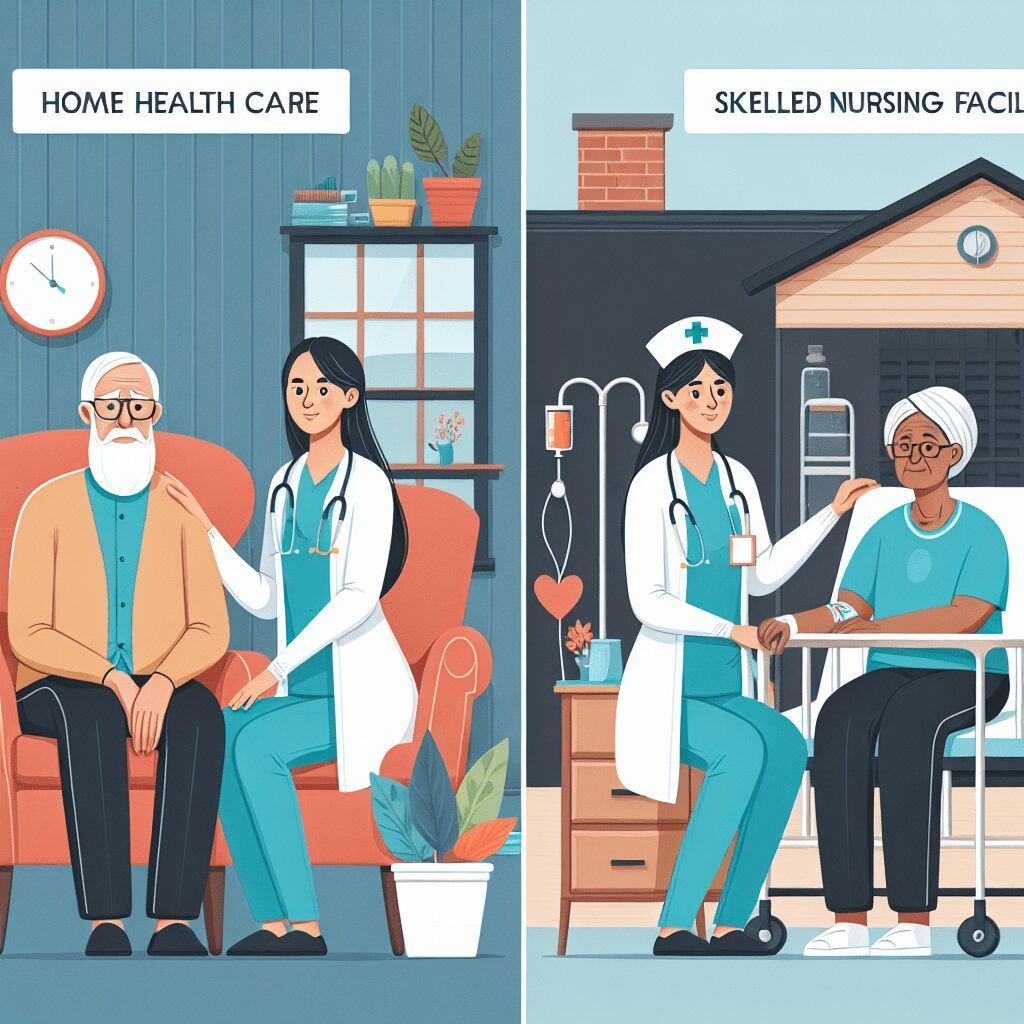Understanding Dementia at a Skilled Nursing Facility
Dementia can be hard for both individuals and caregivers. When care at home is not enough, options like residential care are considered. Knowing the difference between memory care and skilled nursing is important when choosing the right care.
Memory care is for those with cognitive decline, like Alzheimer’s or dementia. Skilled nursing offers 24/7 medical care. Understanding these differences can help you decide what is best.
Understanding Dementia at a Skilled Nursing Facility
Skilled Nursing Facility Dementia is a type of care for residents with cognitive decline like Alzheimer’s and dementia in a nursing home. These residents need constant high-level care for their medical needs. Challenges for residents with dementia include memory loss, cognitive decline, and behavioral changes. Staff training is important to handle these challenges effectively.
Specialized memory care services in a nursing home involve tailoring care to meet the unique needs of those with Alzheimer’s and dementia. The focus should be on cognitive abilities, personalized care plans, and brain-strengthening activities to support residents’ well-being. Nursing homes can create a safe environment to help those with memory impairments live with dignity and comfort, maintaining their quality of life.
What is Skilled Nursing Facility Dementia?
Exploring the impact of dementia in a nursing home setting
Dementia affects daily life in nursing homes. Caregivers face challenges like addressing frustration, anxiety, and loneliness in residents with dementia. Nursing homes can adapt their environment by offering memory care services and brain-strengthening activities.
A homelike setting with personalized care, exercise programs, and spiritual activities can improve residents’ quality of life. Services like memory care facilities and residential agencies are essential for providing specialized care to individuals with dementia in long-term settings.
Recognizing the challenges faced by residents with dementia
Residents with dementia in skilled nursing facilities often experience memory loss, confusion, and changes in behavior.
These challenges impact their daily activities and interactions. Staff can address these challenges by receiving specialized dementia care training.
Understanding residents’ unique needs enables staff to provide personalized care and create a supportive environment.
Implementing memory care programs and engaging residents in tailored activities enhances their quality of life.
Structured routines, calm atmospheres, and sensory stimulation reduce agitation and improve mood.
Creating a safe environment in nursing homes is crucial to prevent wandering and ensure residents’ safety.
Focusing on promoting independence and dignity through compassionate care better supports individuals with dementia.
Why In-Home Health Agencies Are Better for Dementia Care
In-home health care agencies are better suited to provide dementia care for several reasons. Firstly, they offer a familiar environment where patients feel more comfortable and secure, reducing confusion and anxiety associated with unfamiliar surroundings. This familiarity can significantly benefit dementia patients, helping to alleviate distress and improve overall well-being.
Secondly, they provide personalized care plans tailored to the specific needs of each dementia patient. Unlike the standardized care often found in nursing facilities, in-home caregivers can adapt their approach based on the patient’s preferences, abilities, and routines. This individualized care enhances the patient’s quality of life and promotes greater independence and dignity.
Additionally, in-home health care agencies offer a more flexible and adaptable level of care compared to nursing facilities. Caregivers can quickly address changes in the patient’s health status and modify care plans accordingly, ensuring that the patient’s evolving needs are met effectively. This responsiveness is particularly important for dementia patients, whose conditions may fluctuate over time.
Having health services at home can also bring families closer together when it comes to taking care of their loved ones. Family members can pitch in with the patient’s care, offering important support and companionship. This teamwork helps the patient feel more connected and emotionally supported, leading to a more well-rounded and personalized caregiving experience.
Overall, in-home health care agencies offer a personalized, flexible, and family-centered approach to dementia or Alzheimer’s care, providing patients with the support they need to live safely and comfortably in their own homes. By prioritizing familiarity, individualized care, and family involvement, these facilities ensure that dementia patients receive the highest quality of care while maintaining their dignity and independence.
Creating a Safe and Supportive Environment for Individuals with Memory Impairments Through In-Home Skilled Nursing
In-home skilled nursing offers a secure and nurturing environment for individuals with memory impairments, providing tailored care that addresses their unique needs, for patients with conditions such as Alzheimer’s or other forms of dementia, familiar surroundings and personalized care are crucial in maintaining their safety and well-being. Unlike the structured and often impersonal settings of traditional nursing facilities, in-home skilled nursing integrates professional medical care with the comforts of home, fostering a sense of security and emotional stability.
Enhancing Safety in Familiar Surroundings
In-home skilled nursing for individuals with memory impairments offers the benefit of staying in familiar surroundings, reducing confusion and anxiety. Caregivers assess home safety, making adjustments to minimize hazards and implementing fall prevention strategies tailored to the patient’s needs. These measures promote physical safety and empower patients to move around their homes with confidence, preserving their independence.
Personalized Care Plans and Supportive Strategies
In-home skilled nursing offers personalized care plans for individuals with memory impairments. Caregivers work closely with patients and their families to develop tailored care plans that address the patient’s cognitive abilities, preferences, and routines. These plans include daily activities that promote cognitive engagement and physical activity to maintain or improve cognitive function.
Caregivers also provide medication management, vital signs monitoring, and strategies for assistance with daily living activities. Patient education is emphasized, covering dementia symptom management, medication adherence, and lifestyle modifications for overall health. This comprehensive approach helps meet the patient’s medical needs while also helping them maintain a sense of normalcy in their daily routine.
Emotional and Social Support in a Home Setting
The emotional and social aspects of care are vital for individuals with memory impairments. In-home skilled nursing creates a supportive environment by offering companionship and engaging patients in meaningful activities that stimulate their cognitive abilities and emotional well-being.
Caregivers organize activities based on the patient’s interests, such as music therapy, arts and crafts, or simple exercises, which can be both therapeutic and enjoyable.
Furthermore, in-home skilled nursing encourages family involvement, allowing loved ones to participate in the caregiving process. This involvement strengthens familial bonds and provides additional emotional support, which is crucial for patients coping with memory impairments. The familiar home setting enables patients to maintain their social connections and participate in family life, contributing to a more fulfilling and supportive care experience.
In summary, in-home skilled nursing creates a safe and supportive environment for individuals with memory impairments by integrating safety measures, personalized care plans, and emotional support within the familiarity of their own homes. This approach not only enhances physical safety and medical care but also promotes cognitive engagement, emotional stability, and social connections, ensuring that patients receive comprehensive and compassionate care tailored to their unique needs.
FAQ
What is dementia, and how does it impact patients?
Dementia is a decline in mental ability severe enough to interfere with daily life. It impacts residents at a skilled nursing facility by causing memory loss, confusion, and difficulty communicating.
What are the common symptoms of dementia that nurses should be aware of?
Common symptoms of dementia that nurses should be aware of include memory loss, confusion, difficulty with communication, changes in mood or behavior, and wandering aimlessly.
For example, a person with dementia may forget recent conversations, become disoriented in familiar places, struggle to find the right words, exhibit sudden mood swings, or wander away from home.
What training and support is available for staff members working with residents with dementia?
Training and support options include dementia care workshops, specialized training programs on communication and behavior management, and access to resources such as online courses, support groups, and consultation services with dementia care experts.
Trust in ABET Life Home Health & Caregiving’s skilled nursing team for compassionate and specialized care tailored to individuals with dementia. Our licensed professionals provide expert support, understanding the unique challenges of dementia care and ensuring the highest level of comfort and safety for your loved one. Rest easy knowing they’re in capable, understanding hands
The post Understanding Dementia at a Skilled Nursing Facility first appeared on Home Health & Care Giving Service in Houston, TX.

Whether dealing with chronic illness or needing help recovering a surgery, ABET Life will support you with our focused care — covered by Medicare or other insurance carriers for qualified patients.
USEFUL LINKS
All Rights Reserved | AbetLife, Inc | Terms of Use | Privacy Policy











